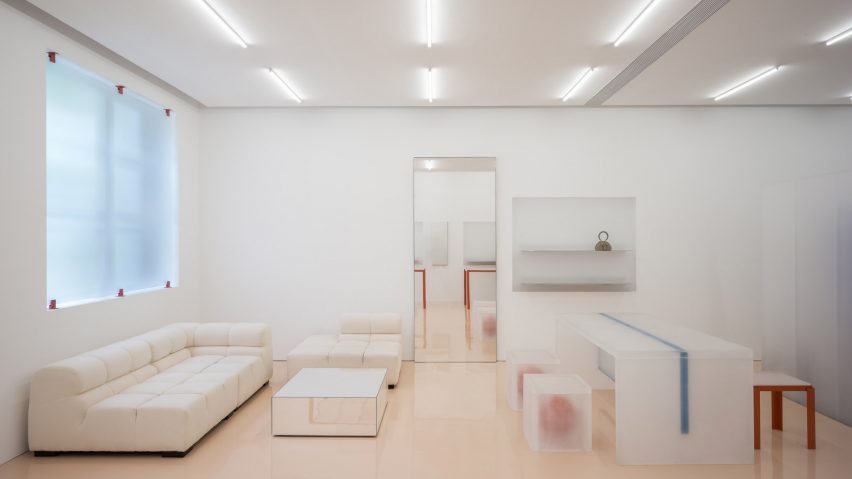Milky resin envelops the windows and furniture within this accessories store in Hangzhou, China, designed by local studio Say Architects.
Located in the city's newly-developed Binjiang District, Lika Lab is a boutique selling bags and jewellery, which the owners wanted to display within a red and blue interior.
Concerned that the bright hues would distract from the products on show, Say Architects proposed softening the colours with a "translucent skin" in the form of frosted resin panels.
These were used to clad 12 pieces of bespoke, steel-framed display furniture, helping to blur the outline of the metal skeletons underneath and tempering their bright colours to create a "dematerialised" effect.
"Under the translucent skin, the material and structure are no longer directly visible to the eye," said the studio, which is led by Yan Zhang and Jianan Shan.
"The whole space is light and soft, and the space and goods are instantly balanced appropriately."
Frosted resin also covers the store's two windows, diffusing the light and creating a visual barrier to the outside.
The walls are painted white while the floor is finished in a glossy, peach-coloured resin to complete the hazy ambience.
Say Architects chose simple, fluorescent LED tube lights that don't create sharp shadows to ensure that the interior would remain translucent, soft and "unclear".
A leisure area with a white corner sofa and resin coffee table sits by the window next to two display tables, which consist of red steel frames inlaid with square resin tiles.
A long, blue steel table encased in resin and four cuboid stools with red spheres at their centre anchor the store's "remade area", where shoppers can customise their bags.
Within its 100-square-metre floor plan, Lika Lab also accommodates a storage area with a curved, blue metal rail enclosed behind two frosted resin room dividers to help it fade out of view.
Each resin panel was cast individually before being joined together to form the different furniture pieces.
"We didn't want to use any glue in the joint, so we designed each piece of furniture with a mortise and tenon-like detail," Zhang told Dezeen.
"However, acrylic is not like wood. It doesn't have any flexibility, so we used translucent rubber pads in each joint to fix the pieces."
Other projects that Say Architects has completed in Hangzhou include a minimal patisserie with an entrance made of curved tiles and a grooming salon for pets complete with a sunken cafe, playground and paddling pool.
Photography is by Minjie Wang.

